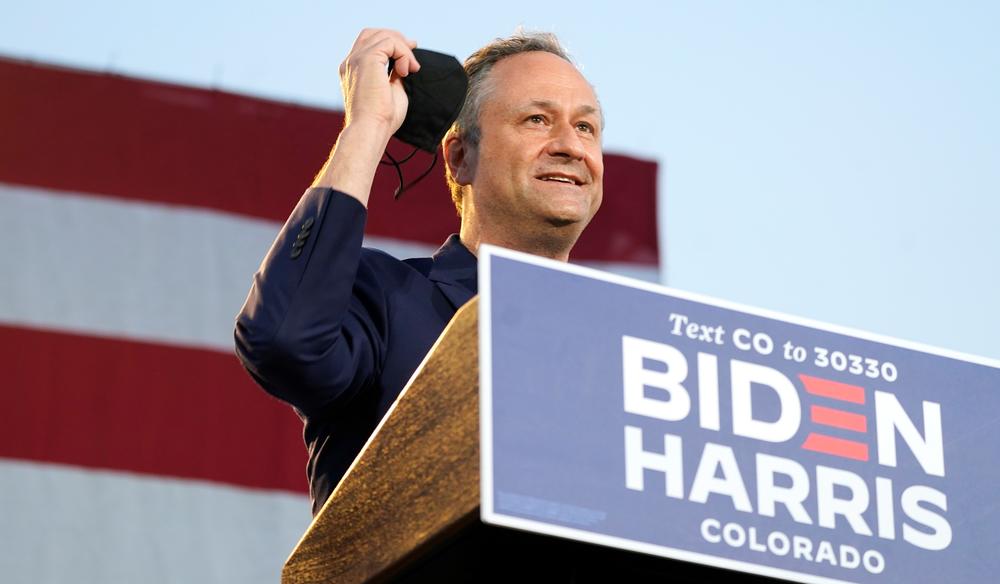Section Branding
Header Content
Poised To Be America's 1st Second Gentleman, Doug Emhoff Shakes Up Gender Stereotypes
Primary Content
With Kamala Harris poised to become the country's first female vice president, she brings with her another historic first: America's first second gentleman, her husband, Doug Emhoff.
Emhoff, 56, is already shaking up gender stereotypes, a point highlighted by Joe Biden when he appeared for the first time with Harris as his running mate in August. Addressing Emhoff with a grin, Biden said, "Doug, you're gonna have to learn what it means to be a barrier breaker yourself in this job you're about to take on."
Before the election, when Emhoff took questions from kids online in the "Ask a Grownup" video series, a 9-year-old named Atticus posed this hypothetical: What would you do if your wife became vice president?
"Well first, I'd say YAAAYYY!" Emhoff replied. "And then I'm just gonna do what I always do, Atticus, I'm gonna support her. Because it's really important for men and even young boys to support the strong and wonderful women in their life."
That's an inspiring and necessary message, said Jamia Wilson, executive director of the Feminist Press, a publisher based at the City University of New York.
"We need to show boys more multidimensional examples of what it means to be a woman and what it means to have power," she said. "That, I think, is what's most exciting to me about Douglas Emhoff: that he has had periods of taking a back seat, although he has his own very powerful career — to understand that listening, following, is also an important way to lead."
For Wilson, the fact that Harris and Emhoff are an interracial couple adds another layer to the dynamic.
"As a Black woman," she said, "I think it's extremely noteworthy for all of us to also think about what it means for Douglas Emhoff to be supporting the first woman vice president in this country, but also the first South Asian and Black woman vice president in this country. And what that means around disrupting how we look at power and how we look at allyship."
That disruption of power puts Harris out front and her husband behind, advancing her ambition.
Emhoff, a prominent entertainment and media lawyer, and partner with the huge global law firm DLA Piper, has said he will sever all ties with the firm before Inauguration Day to avoid potential conflicts of interest. He has said he will give up his career, for now, to serve as second gentleman.
He may need to do some mental adjusting as well, cautions Dan Mulhern, who spent eight years as the first gentleman of Michigan when his wife, Jennifer Granholm, was governor.
"The sense of lost control, I think, for a man is challenging," Mulhern said. "We like to be in control. I think it's kind of deeply wired."
With all the focus on his wife, Mulhern had to get used to being "in the shadows," with people walking past him as if he weren't even there.
"I always had a big ego," Mulhern said. "I wanted to matter!"
If he were to offer Emhoff any advice, it would be this: Let go of your ego and enjoy the ride.
"There's a, I think it's Yiddish, is kvell, you know, just kvell in your wife's success," Mullhern said. "Savor it and be in it, and be proud of it, and don't feel like you have to do more than be what helps her."
But Emhoff will doubtless do something as second gentleman.
Historically, second ladies have carved out their own niche: Karen Pence has highlighted art therapy. Jill Biden focused on military families and the importance of community colleges. Tipper Gore concentrated on mental health issues.
Emhoff has mentioned he would like to work on issues involving access to justice.
Kathleen Dolan, a political science professor at the University of Wisconsin-Milwaukee, wonders whether, unfortunately, it's only with a man as second spouse that the role will become more meaningful.
"I'm just curious," Dolan said, "when we see a man in the role for the first time, how quickly we redefine the role or how quickly we redefine the possibilities of the role."
Dolan studies gender and politics and imagines the administration's thinking about Emhoff going something like this: "'Boy, look at that experience, look at that training, look at all the skills,'" she said. "'You know, he's not going to want to simply sit around the Naval Observatory and not have anything to do all day. We've got to find a role for him somewhere!' Where nobody has said that about the female spouses in those roles to this point. And there's something deeply sad about that."
Still, it's radical to see a traditional gender dynamic being inverted in the second highest office in the land, said Jennifer Weiss-Wolf, the women and democracy fellow at the Brennan Center for Justice.
"I guess in some ways we don't necessarily want and need all eyes on what this means for men," she said. "But what it means for men means something for women, too, because this is the society that we all live in. So it's absolutely historic."
Throughout the campaign, Weiss-Wolf was struck by how Emhoff interacted with Harris: "His presence and his pride and his sort of unfettered joy in the ascent of his wife is quite a remarkable sight, I think, for everybody — not just for women, but for men and for boys to see, too."
Reflecting on the significance of this moment, Kelly Dittmar, research director at the Center for American Women and Politics, thinks about the line that Harris has often used: "She says, you know, we have to be unburdened by what has been to consider what can be. And I think this is one small piece of that."
And wouldn't it be nice, muses Wilson of the Feminist Press, if what can be becomes totally normal.
"I hope that I get to live long enough to get to a point where we have less firsts," Wilson said.
What would it look like, she wonders, to have a world where this wouldn't even be news?
Copyright 2020 NPR. To see more, visit https://www.npr.org.


